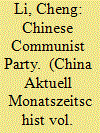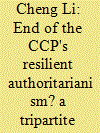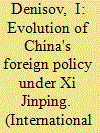| Srl | Item |
| 1 |
ID:
149418


|
|
|
| 2 |
ID:
091521


|
|
|
|
|
| Publication |
2009.
|
| Summary/Abstract |
This article explores two interrelated aspects of the new dynamics within the CCP leadership - the new elite groups and the new ground rules in Chinese politics. The first shows profound changes in the recruitment of the elite and the second aims to reveal the changingmechanisms of political control and the checks and balances of the Chinese political system.The article argues that the future of the CCP largely depends on two seemingly contradictory needs: how broad-based will the Party's recruitment of itsnew elites be on the one hand and how effective will the top leadership be in controlling this increasingly diverse political institution on the other.
|
|
|
|
|
|
|
|
|
|
|
|
|
|
|
|
| 3 |
ID:
119179


|
|
|
|
|
| Publication |
2012.
|
| Summary/Abstract |
This essay challenges the widely held view of the CCP's purported "resilient authoritarianism," which asserts that China's one-party political system is able to enhance the state capacity to govern effectively through institutional adaptations and policy adjustments. An analysis of the recent and still unfolding Bo Xilai crisis reveals the flaws in China's political system, including nepotism and patron-client ties in the selection of leaders, rampant corruption, the growing oligarchic power of state-owned enterprises, elites' contempt for the law and the potential failure to broker deals between competing factions in the Party leadership. The essay argues that the CCP's "authoritarian resilience" is a stagnant system, both conceptually and empirically, because it resists much-needed democratic changes in the country. The problems of the resilient authoritarianism thesis is traceable to the monolithic conceptualizing of China - the failure to appreciate seemingly paradoxical transformative trends in the country, which this essay characterizes as three paralleled developments, namely, 1) weak leaders, strong factions; 2) weak government, strong interest groups; and 3) weak Party, strong country. One should not confuse China's national resilience (in terms of the emerging middle class, new interest group politics, and dynamic society) with the CCP's capacity and legitimacy to rule the country. The essay concludes that if the CCP intends to regain the public's confidence and avoid a bottom-up revolution, it must abandon the notion of "authoritarian resilience" and embrace a systematic democratic transition with bold steps towards intra-Party elections, judicial independence and a gradual opening of the mainstream media.
|
|
|
|
|
|
|
|
|
|
|
|
|
|
|
|
| 4 |
ID:
140584


|
|
|
|
|
| Summary/Abstract |
XI JINPING has been more successful than his predecessor, Hu Jintao, in consolidating China's system of government. The domestic political agenda of the "Xi-Li rule" (Li Keqiang is prime minister and an ideologue of the "fifth generation") with the institutions and mechanisms that it has brought into being has taken even less time to put together than observers generally expected. This is the result of Xi's style of governance and new and more difficult challenges that have needed prompt reactions, chiefly internal Communist Party issues that had obviously been the new leader's priorities until mid-2013 or even later.
|
|
|
|
|
|
|
|
|
|
|
|
|
|
|
|